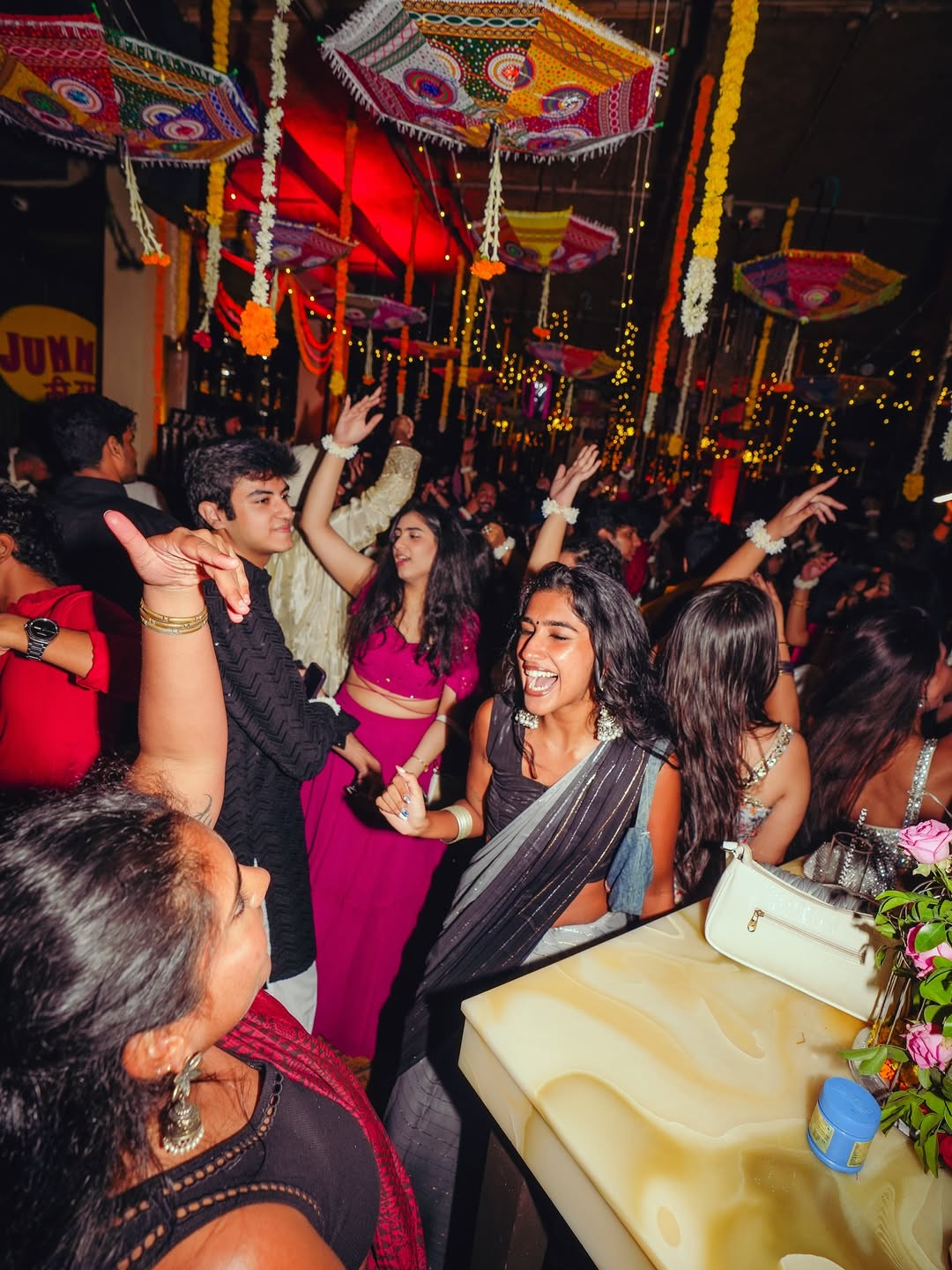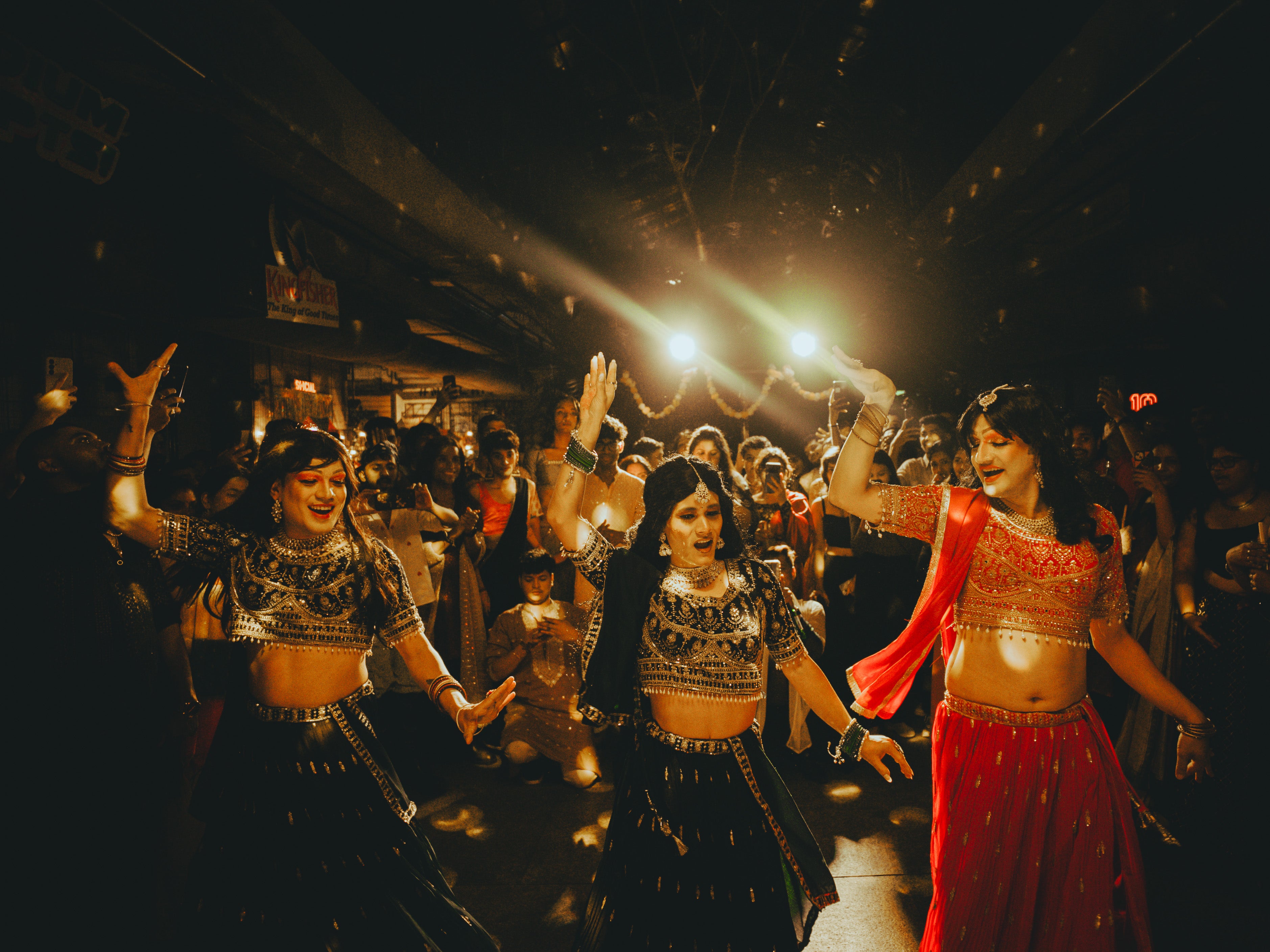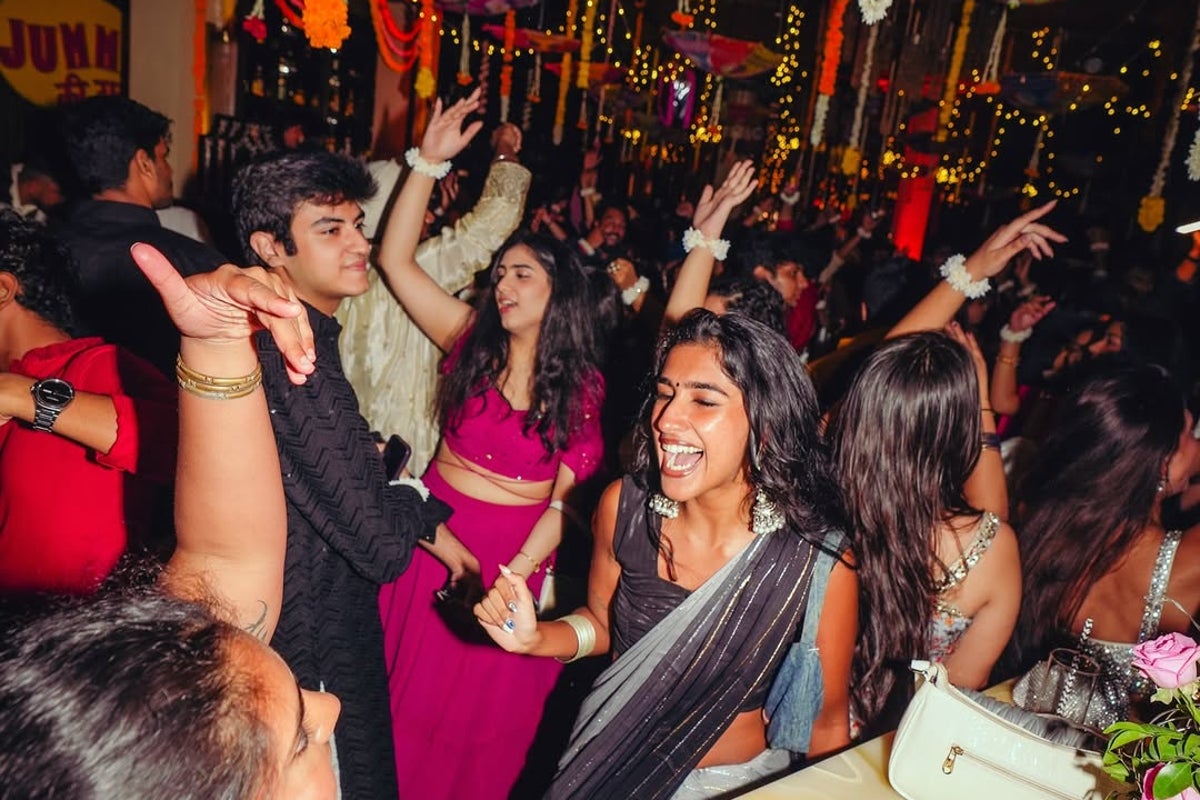In a country where weddings power a nearly £100bn industry and the uber-rich spend millions celebrating a single union, a counter-trend is quietly gaining ground: young urban Indians are paying to attend “weddings” where no couple is tying the knot and where the only promise is a night of music, dancing and spectacle.
These fake wedding parties mimic the atmosphere of a traditional Indian one, complete with marigold garlands, shimmering sarees and lehengas, and Bollywood playlists – but without the rituals, the family drama and the financial burden. What started as a novelty in the capital Delhi earlier this year quickly spread to Bengaluru, Hyderabad and beyond, transforming into one of the year’s most talked-about social phenomena.
To understand the appeal, it helps to grasp the scale of the Indian wedding itself. The country hosts around 10 million weddings annually, according to industry estimates, and families often spend years saving for the occasion.
In 2024, investment advisory firm Wright Research valued the Indian wedding services sector at over £75bn, while market research and consulting company Grand View Research forecast an annual growth of more than 14 per cent through the decade.
Indian weddings are sprawling affairs that can last anywhere between three and seven days, often involving hundreds if not thousands of guests.
Traditions vary across regions and religions. Ceremonies can include kanyadaan, which involves a father symbolically giving his daughter away; saptapadi, the ritual of walking seven steps around a sacred fire to seal the union; haldi, a ritual of applying turmeric paste to bride and groom as a cleansing and purifying blessing; and sangeet, a music and dance celebration held a day or two before the formal wedding to unite families and break any tension.
In Sikh weddings, couples walk around the sacred scripture during the ceremony, while the nikah for Muslims marks the formal signing of the marriage contract.
Alongside such old rites, however, weddings are now consumer spectacles, fuelled by choreographed dance routines, themed décor, gourmet catering, and appearances by celebrities.
Nowhere was this more spectacularly visible than at the wedding of Anant Ambani, the son of India’s richest man, to Radhika Merchant last year. The celebrations began in March and ended in July, featuring Rihanna, Katy Perry, Pitbull, and Andrea Bocelli among celebrity performers, drawing entertainment royalty and political figures as guests, and stretching across multiple global locales.
The cost was reported in the hundreds of millions of dollars, making it one of the most expensive weddings in history.
For most ordinary Indians, weddings may never reach such extremes. But the Ambani nuptials crystallised how the institution had come to embody social status, cultural aspiration and financial display. And yet, what people often remember most about weddings is a lot simpler – the dancing, the crowd, the collective joy of celebration.
In the shadow of such extravagance, fake weddings reclaim the pageantry at minimal cost. For a ticket priced anywhere between £4 and £60, you can step into the revelry without responsibility.
Jummaa Ki Raat, an event organiser in Delhi, was among the first to launch what it labelled a “Fake Sangeet” in February. Co-founder Sahib Gujral says the idea began almost as a joke when they experimented with floral décor that resembled a wedding stage.
“You dress up like you’re going to a wedding, dance to the songs, decorate like a wedding, that’s about it,” he explains to The Independent.
There are no mock rituals, no exchange of vows or garlands – only the parts of a wedding that guests most enjoy.
At one of the fake weddings in the capital, guests joked about whether they belonged to the “bride’s side” or the groom’s even though neither existed.
Strangers posed for family-style photos, others broke into choreographed moves and by midnight the dance floor looked less like satire and more like pure celebration.
The events are no longer a niche youth fad either, bringing together a broad spectrum of people.
Young professionals and students mingle with older attendees who missed celebrating their own weddings during the pandemic. A 21-year-old man who attended Jummaa Ki Raat’s fake sangeet says the atmosphere was more inclusive than at a nightclub. “Usually I wouldn’t go to a club by myself but here people don’t just stick to their groups, they try to include everyone,” he adds.
For Pooja, who attended a two-day fake wedding in Delhi, the appeal was also practical. “I had an expensive lehenga sitting in my cupboard from a cousin’s wedding. I would get stared at if I wore it at a nightclub, but it is literally the dress code here,” she tells The Independent.

Some people see these events as a chance to live out their cinematic fantasies. Karan, 24, attending a fake wedding in Delhi with his girlfriend, tells The Independent about growing up on a diet of Bollywood films in which weddings are often the ideal setting for the leads to declare their love through song and dance.
“You can’t sell me Shah Rukh Khan singing to Kajol at different weddings, and then expect me not to want that. When do I get to dance with my girlfriend to ‘Dilliwaali Girlfriend’? Apparently only at this fake wedding event because my parents will disown me if I say I’m going to serenade her at cousin Neha’s wedding,” he says.
The concept is also being adapted to create space for marginalised communities. In the southern cities of Bengaluru and Hyderabad, curators Vaibhav Kumar Modi and Ashish Chopra hosted Shadi Mubarak, a queer-centred fake wedding event.
Chopra, founder of queer events collective BeUnic, tells The Independent he imagined the event as a glimpse of the marriage he could not legally have in India. “It was nothing less than magic. Everyone who missed it saw pictures and begged us to do it again.”
Guests included drag queens, couples of all genders, and allies who joined traditional wedding games such as searching for rings in bowls of milk.
Modi, founder of cultural experiences venture Dark Vibe Society, says the symbolism is important. “We are as Indian as anyone else, and weddings belong to us too,” he says.
His own mother, who had never visited a nightclub, attended and found herself at ease with the décor and music. “It didn’t feel like an event, it felt like we had come home,” he recalls.

The fake weddings have faced little resistance so far in a country where norm-breaking is often met with hostility. But the line between parody and offence remains thin. In the western state of Maharashtra, police raided a “fake marriage party” earlier this year where minors were found drinking, detaining dozens and charging organisers under child protection laws.
Critics dismiss the fake wedding craze as a fleeting fad, propelled by social media algorithms. Some organisers believe the novelty may fade in major cities, but see potential for long-term success in smaller towns where such immersive events are rare.
Weddings are universally understood in India, Modi says. “They are like salt, every Indian household knows them.”
That shared language, he believes, makes them endlessly adaptable.
It’s already clear that fake weddings tap into desire as well as discontent: desire for spectacle, glamour and collective joy and discontent with weddings as burdensome, judgement-laden and exorbitant. They allow young Indians to embrace the energy of the country’s most enduring ritual without shouldering its costs or consequences.
Gujral believes the success of such events is a reaction to the pressures and costs of actual weddings. “This is what the wedding industry in India has sold us for decades, and I feel like weddings have become more about how much money was spent on it than rituals itself,” he says.
“We have just decided to capitalise on it and turn it into a product you can sell.”
For now, the drums, marigold garlands and glittering saris continue to draw crowds eager to experience a wedding without its associated pressures and anxieties.
In a place where weddings are a sacred duty as much as a staggering financial performance, a chance to dance all night under fairy lights and a rose-petal canopy without obligation may itself be the most modern ritual of all.




